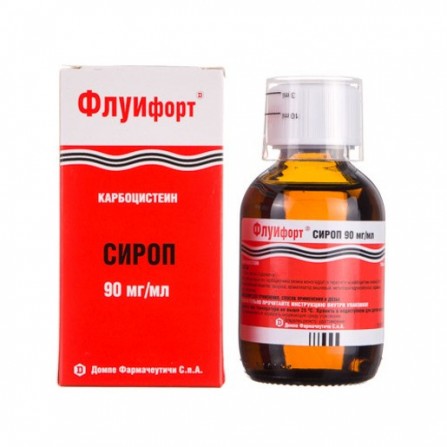Fluifort syrup 90mg ml 120ml
Condition: New product
1000 Items
Rating:
Be the first to write a review!

More info
Description
Fluifort syrup is a mucolytic and expectorant effect due to the activation of sialic transferase, an enzyme of the goblet cells of the bronchial mucosa.
Active ingredients
Carbocysteine
Release form
Syrup
Composition
Carbocysteine monohydrate, sucrose, natural cherry essence, methyl p-hydroxybenzoate, caramel, purified water.
Pharmacological effect
Fluifort normalizes the quantitative ratio of acidic and neutral sialomucins of bronchial secretions, restores the viscosity and elasticity of mucus. It promotes the regeneration of the mucous membrane, normalizes its structure, activates the activity of the ciliary epithelium. Restores the secretion of immunologically active IgA (specific protection) and the number of sulfhydryl groups of mucus components (non-specific protection), improves mucociliary clearance.
Pharmacokinetics
Rapidly and completely absorbed after oral administration. The maximum concentration in the blood and secretions is achieved within the first hour after taking the drug. Therapeutic concentration is retained in the blood for 8 hours. The half-life is 1.8 hours. It is excreted mainly with urine, approximately 30-60% - in an unchanged form, the rest - in the form of metabolites.
Indications
Acute and chronic bronchopulmonary diseases accompanied by the formation of viscous and difficult to separate sputum (tracheitis, bronchitis, tracheobronchitis, bronchial asthma, bronchiectasis) and mucus (inflammatory diseases of the middle ear and paranasal sinuses - rhinitis, adenoiditis, otitis media, sinusitis). bronchoscopy or bronchography.
Contraindications
Hypersensitivity to carbocisteine, peptic ulcer and duodenal ulcer and stomach (in the acute phase). Children under 1 year old, pregnancy (I term), lactation period.
Precautionary measures
Use with caution: pregnancy II-III trimester, peptic ulcer and 12 duodenal ulcer (in history).
Use during pregnancy and lactation
May be used during pregnancy and lactation after consulting a doctor.
Dosage and administration
Inside The package includes a graduated measuring cup, according to the recommended doses. Children over 5 years: 5 ml of syrup (450 mg) - 2-3 times a day.Children from 1 to 5 years: 2.5 ml of syrup (225 mg) - 2-3 times a day. Adults: 15 ml of syrup (1.35 g) - 2-3 times a day. The duration of treatment is determined by the doctor (from 4 days to 6 months). This dosage is reserved for patients with impaired liver and kidney functions, as well as for patients with diabetes. To open the bottle, press the cap firmly on top and turn counterclockwise. After application, re-tighten the cap.
Side effects
The following side effects are characteristic of carbocysteine: rarely - gastritis, nausea, diarrhea, dizziness, indisposition, skin rash. Carbocysteine lysine salt: rarely - epigastric pain, nausea, diarrhea, skin rash. All of these violations are transient in nature and disappear after stopping the drug or after reducing the dosage. If any side effect occurs, you should contact your doctor.
Overdose
Currently, cases of drug overdose Fluifort were reported. Possible symptoms of overdose: stomach pain, nausea, diarrhea. Treatment: symptomatic. There is no specific antitode.
Interaction with other drugs
Currently unknown cases of interaction of carbocysteine and drugs commonly used in the treatment of diseases of the respiratory tract. There was no interaction of the drug and food, as well as substances used for laboratory research. The effect is weakened by antitussive and M-anticholinergic drugs. Increases the effectiveness of glucocorticosteroids (mutually) and antibacterial therapy of infectious and inflammatory diseases of the upper and lower respiratory tract. Strengthens the bronchodilator effect of theophylline.
special instructions
From the first days of taking the drug, due to improved clearance of secretions, the expectorant effect is enhanced. Fluifort syrup contains sucrose. This should be taken into account by patients on a low-calorie diet and diabetics. With concomitant diabetes, it is necessary to consider the sucrose content in the syrup: 5.25 g per 1 tablespoon in the syrup for adults and 3.5 g per 1 teaspoon in the syrup for children. Treatment can be combined with physiotherapeutic procedures.The use of Fluifort does not lead to addiction or metabolic dependence.


